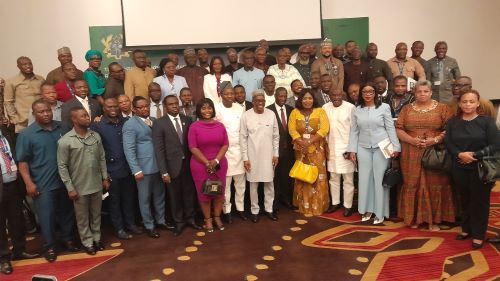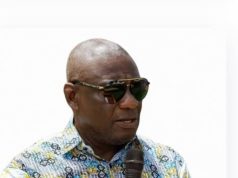Ghana is facing an environmental and social crisis due to the devastating impact of small-scale mining operations.
The country’s forests are being decimated, farmlands degraded, and rivers polluted with toxic chemicals. The Ghana Water Resource Commission reports that turbidity levels of water are far beyond the acceptable range, making it undrinkable.
The government has acknowledged the crisis and is taking steps to address it. A conference was recently held to sensitize Members of Parliament (MPs) on the effects of small-scale mining activities.
In a welcome address at the one day conference themed; “Restoring a Culture of Proper Small-Scale Mining in Ghana” Emmanuel Armah-Kofi Buah, Minister for Lands And Natural Resources, emphasized that small-scale mining, when done responsibly and within the framework of the law, is not the enemy but rather a vital sector that provides employment and contributes to the national economy.
According to Mr Buah, the problem lies in the illegal and unregulated activities that have taken hold, driven by greed and a disregard for the laws and environment. “The government is committed to fighting these menace and has intensified collaboration with security agencies to clamp down on
illegal mining” he added.
Key Proposals to Address the Crisis
-Strengthening Law Enforcement: The government is working to strengthen law enforcement efforts to clamp down on illegal mining.
– Reviewing the Licensing Regime: The licensing regime is being reviewed to ensure a streamlined process for granting permits to those who meet the legal and environmental requirements.
– Decentralizing Permitting and Policing: Proposals are being considered to decentralize the permitting and policing process to the district level, to hold authorities accountable and to ensure effective enforcement.
The sector minister who doubles as the Member of Parliament (MP) for Ellembella Constituency in the Western Region pointed
out that the fight against the devastating impact of small-scaling requires a collective effort. The future of the nation depends on the actions taken today, and the government is urging all stakeholders to participate in the discussions and work together to forge a common vision and clear roadmap for sustainable mining practices.
In a keynote address at the inaugural parliamentary conference focused on restoring a culture of proper small-scale mining, Vice President of Ghana, H.E prof Jane Naana Opoku Agyeman, conveyed warm greetings and congratulations to the newly elected Members of Parliament. Speaking further, she highlighted the crucial role parliamentarians play in shaping the nation’s future.
The Vice President emphasized the alarming environmental degradation caused by illegal mining practices, noting the significant pollution of water bodies and the degradation
of forests, which pose serious threats to Ghana’s ecosystems and the livelihoods of many communities. “We have witnessed the distressing effects of illegal mining activities,” Dr. Bawumia stated. “Our water bodies are polluted, and we have lost 44% of our forest reserves. The public outcry over these issues underscores the urgency with which we must act.”
The Vice President urged parliamentarians to recognize their dual role as lawmakers and representatives of their constituents, many of whom are directly affected by the consequences of illegal mining. He stressed the importance of engaging in meaningful dialogue to formulate effective strategies that protect both the environment and the livelihoods of Ghanaians.
Furthermore, Prof Opku Agyeman acknowledged that restoring responsible mining practices requires a multi-stakeholder
approach and highlighted the government’s commitment to curbing illegal mining activities. She lauded the Minister for Lands and Natural Resources, Emmanuel Armah-Kofi Buah for his proactive engagement with stakeholders, including traditional leaders and security agencies, to strengthen enforcement measures and reclaim degraded lands. As the conference progressed, the Vice President called for a shared sense of responsibility among participants, urging them to move discussions beyond mere rhetoric to actionable solutions that promote economic empowerment and sustainable development through small-scale mining.
In closing, Prof Opoku Agyeman expressed gratitude to the conference organizers, speakers, and participants for their dedication to addressing this critical issue. He encouraged all attendees to leave the conference with a renewed sense of purpose to foster a culture of responsible mining in Ghana. “Let us engage constructively and
effectively, and work together for a sustainable future,” she added.
Speaker of Parliament Calls for Collective Action Against Destructive Mining Practices
Rt. Hon Alban Bagbin, Speaker of Ghana’s Parliament, has emphasized the need for a collective effort to address the challenges posed by artisanal and small-scale mining in Ghana. In his closing remarks, Bagbin stressed that the issue requires a collaborative approach, involving not just the government, but also civil society, traditional leaders, and the general public.
Bagbin noted that the devastating impact of destructive mining practices on the environment, water bodies, and food crops cannot be ignored. He emphasized that as representatives of the people, members of parliament have a sacred duty to ensure that the country’s resources are managed
responsibly and sustainably.
The Speaker also highlighted the need to distinguish between legal and illegal mining activities, pointing out that some small-scale mining operations are legal, while others are not. He emphasized that the solution to the problem lies in finding a balance between promoting economic development and protecting the environment.
Mr. Bagbin commended the Minister for his initiative in addressing the issue and assured him of parliament’s support in providing the necessary legislative backing and oversight. He also warned that any member of parliament found to be complicit in destructive mining activities would face the full force of the law.
The Speaker’s call to action comes as Ghana struggles to address the environmental and social impacts of artisanal and small-scale mining. With the government, civil society,
and traditional leaders working together, there is hope that a solution can be found to this complex problem.
The conference, themed “Restoring a Culture of Proper Small-Scale Mining in Ghana,” aims to address the pressing challenges associated with small-scale mining while ensuring its sustainability and benefits to local communities.
The conference sets a vital stage for collaborative efforts aimed at transforming the small-scale mining sector in Ghana, ensuring it contributes positively to the economy and society at large.
By Kingsley Asiedu
Send your news stories to newsghana101@gmail.com
Follow News Ghana on Google News















